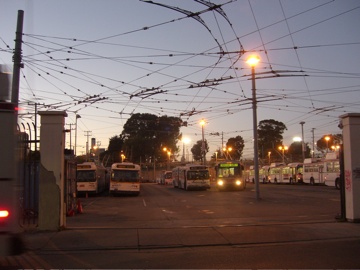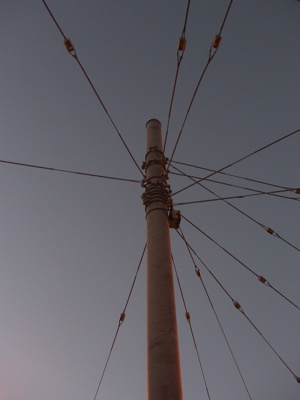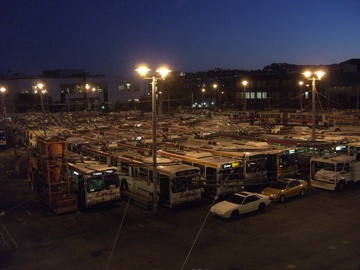As part of my job as a news editor at KQED, I’ve become a sort of part-time water watcher. In that capacity, I’ve done a couple of maps and a couple of posts for KQED’s Climate Watch blog. The latest post just went up yesterday: Everything You Know (About Water) Is Wrong. It’s a short writeup on a new report from the Public Policy Institute of California called “California Water Myths.” The institute is mostly trying to remind us opinionated Californians that we have a lot of misconceptions about how much water we have and how it’s used.
Journal of Self-Promotion
Friday morning, I heard on KCBS, the local all-news AM station, that some students had “taken over” Wheeler Hall, a building on the UC-Berkeley campus. As I wrote our morning news team a note about that, the phone rang. It was one of the morning news team asking whether I could go out and cover the Wheeler Hall story. I said I would.
When I went out to get in the car, I realized I had a flat tire. I thought of riding my bike, but knew it would be hard to find a secure place to lock it up. As I walked back inside the house to ponder my next move — if I walked or took the bus or BART, I’d miss the air time for the upcoming newscast — I heard the neighbors’ dog barking outside. One of the neighbors in question works for the university–in the news office, actually. I ran outside hoping I could catch a ride to campus with him. I did.
I showed up outside Wheeler to find yellow police tape around the building — it might have taken a quarter mile of tape to do put up that line — and several dozen students with banners who had parked themselves across the main north-south path through campus. In a few minutes, I’d sized up what was happening and had lined up a young woman who said she was one of the protest organizers. She wouldn’t give her name, but said it was OK to call her Jane Doe or Emma Goldman. Yeah, she really said that. We put her on the air. I was on, too–both for one of the newscasts and our longer “Forum” discussion show. One observation: I say “um” and “ahhhhh” a lot.
Here are the links to the audio of these immortal radio (and associated) appearances:
The California Report: UC Students Protest Fee Hike
Forum: Students Occupy UC Berkeley Building
Photo slide show: Wheeler Hall protest
And in other self-promotion news: November 22 marks this blog’s sixth anniversary.
News Tales: ‘You’re Still a Kid’
Sometime back in the rich Early Middle Era of my news career — 1987, I’ll call it, at The San Francisco Examiner — something awful happened at about 5 o’clock in the afternoon. A wire-service bulletin said an airliner had gone down somewhere down the coast. I was new on the city desk, and had just started my shift. I had been part of many newsroom scrambles for big stories on deadline, but I was never really in charge of the response. I wasn’t, really, on this night, either. I remember that the senior city editor grabbed a reporter who was just about to leave for the evening and told him he needed to fly down to the crash site. Done. I think my fellow editor collared two or three other reporters who thought they were going home and told them to stand by.
Just recounting the incident revives its horror for me, though I don’t think of it often. What made a more conscious impression, one that still rises to the surface whenever I’m in a newsroom–every working day, now–was the way the editors and reporters reacted to the simple suggestion that a story was happening, that game was afoot.
I’m thinking about that now because my current newsroom, at KQED Public Radio, is in the midst of trying to respond to this week’s problems on the Bay Bridge. Circumstances are a little different now. Much smaller newsroom–which means much smaller staff. No one to stop at the door on the way out and say, “Hey — wait a minute. Big problem on the bridge.” In fact, when the incident occurred the other night, I was winding down from our evening newscasts and getting ready to edit a feature story, a guy wandered over from an adjacent (non-news) department and asked if we knew what was happening on the bridge. When it came down to it on night one, it was me, the local traffic reporting service, and our evening announcer who held the fort. (One of the bosses said to me, “These all-hands-on-deck situations are fun.” I didn’t reflect until later that at first, mine were the only hands on deck.) I had started work before noon and sent my last new email of the night after 1 a.m. I complained mildly on Facebook that it’s harder for me to do those long news days and come back the next day to do it again. The very same editor I was so impressed with that evening back in ’87 responded to that note: “And yet … you’re still a kid.”
Not so sure about that. But some old news reflex is still there.
Journal of Self-Promotion
Contributing to my lack of rest this week was a small radio story I did on locals watching the Tour de France. Through Yelp!, someone at KQED steered me to a little place in Richmond called Catahoula Coffee Company. Originally part of the draw was the news that the cafe opened at 1 a.m. so that people could come watch the Tour. The truth was that it actually opens at 7 — with the Tour playing in mid-stage. Earlier this week I went up there and the owner gave me the run of the place for one morning and part of another. Three minutes of thrilling (and I hope entertaining) audio ensued and aired on KQED’s California Report Magazine this afternoon. Here’s the link to the story page (where the audio will eventually be posted, I think):
http://www.californiareport.org/archive/R907241630/e
And for anyone who’s impatient, who doesn’t want to go to the beautiful California Report site and comment, you can play the story right here:
Journal of Self-Promotion
I’m filling in as morning assignment editor at KQED Radio News–that in addition to my usual duty as PM news editor. So yesterday, someone mentioned that a member of the Assembly from Berkeley was holding a press conference. She wanted to talk about how online retailers who are not required to collect sales tax are affecting local business. Her particular interest, besides the fate of constituents: She had sponsored a bill to start collecting sales tax from Web retailers who have relationships with affiliates in California–people who advertise for the retailers and send business their way in return for a fee. Anyway, we live a mile from where the press conference was being held, and I had a recording kit at home, so I ran over and covered the event. I wrote one story for another reporter to read yesterday afternoon, and another that I recorded for air this morning. You can find it here: http://www.californiareport.org/archive/R907090850/b. Get ready for dulcet tones.
Journal of Self-Promotion
I’m filling in as morning assignment editor at KQED Radio News–that in addition to my usual duty as PM news editor. So yesterday, someone mentioned that a member of the Assembly from Berkeley was holding a press conference. She wanted to talk about how online retailers who are not required to collect sales tax are affecting local business. Her particular interest, besides the fate of constituents: She had sponsored a bill to start collecting sales tax from Web retailers who have relationships with affiliates in California–people who advertise for the retailers and send business their way in return for a fee. Anyway, we live a mile from where the press conference was being held, and I had a recording kit at home, so I ran over and covered the event. I wrote one story for another reporter to read yesterday afternoon, and another that I recorded for air this morning. You can find it here: http://www.californiareport.org/archive/R907090850/b. Get ready for dulcet tones.
National Debut
Last night before leaving the station — KQED in San Francisco — the news desk at NPR in Washington called to ask for a “spot” — a brief story (45 to 60 seconds) for the network’s hourly newscast. They wanted something on our governor ordering a furlough for most state workers — two days a month starting the 1st of February — and a 10 percent pay cut for managers. The order runs through June 30, 2010, and was imposed because the state faces a $42 billion budget deficit between now and then. (Unfortunately, California doesn’t own a printing press to help bail itself out of trouble, and lots of people and institutions are going to pay for the problem we’ve got.)
No one else was available to do the story, so I did it. It consisted of a lead for the NPR anchor to read, a script for me to read, and a soundbite. My understanding was that the 45-second limit was close to absolute. I wrote something that timed at over a minute (the timing was done with me reading the script with a stopwatch running). I hacked 15 or 20 seconds off of that, went to a sound booth, called the NPR editor and read it to him, then recorded myself, added the soundbite, and sent it off to the network.
And that was that. I listened to the newscasts last evening, imagining my little piece would be ringing out over the airwaves. Nothing. I figured other stuff had gotten in ahead of that and put the episode into the valuable experience column.
Then this morning, while we were walking the dog, my sister called from Chicago. “Hey, you have your first groupie,” she said. One of her friends had just called to see if she had some relative who might have had occasion to be on NPR news. As Bozo the clown said once — no, many times — “Hey, that’s me.” So sometime this morning, I made my national debut. Stay tuned for the collectible DVD of the occasion, complete with bonus features, including “The Making of the December 20, 2008, News Brief on California State Employee Furloughs: The True Story.” Autographed, individually numbered, and guaranteed suitable for investment purposes (compared to whatever that Madoff fella sold you.)
Our American Perspective
I edited a story that aired on KQED this morning about a Lebanese-American man, a U.S. citizen, who was seized by state security in the United Arab Emirates nearly three months ago. The man, named Naji Hamdan, has not been charged, and the Emirates haven't seen fit to explain why he's in custody. One reason for that may be that the United States asked the UAE to pick the guy up because the FBI considers him a terrorism suspect.
That surmise aside–the allegation is made in a lawsuit that's supposed to be filed today on Hamdan's behalf by the American Civil Liberties Union–the U.S. embassy in the Emirates seems in no hurry to find out what's happening to an American citizen held without charge by the local secret police. It took the embassy 51 days after the arrest to meet with Hamdan in prison. In response to inquiries from Hamdan's family and Rep. Maxine Waters of Los Angeles, a consular official described the meeting, the prisoner's status, and then offered this perspective on the situation:
"This extended detention, while very unusual from our American perspective, does not run counter to the laws of the United Arab Emirates."
See? The situation only seems unacceptable because of our American perspective. If someone disappears you, accuses you of being a terrorist, roughs you up, and god knows what else–well, you have to understand that's the way they do things in their own country.
Put our pretensions to global omnipotence aside. Put aside, too, our rhetoric about democracy and due process. Still: wouldn't you hope for a little bit more from your government if you found yourself tossed in some hole without explanation?
Here's a story on the case from McClatchy: Did U.S. Push Detention of American Without Charges?
Here's the link to our story, by Rob Schmitz of KQED's Los Angeles bureau: Naji Hamdan case.
Technorati Tags: kqed, war on terror
All-Nighter
The first election night I worked in a newsroom was 1972. Nixon beat McGovern, and the election was called, not prematurely, at 6 p.m. or so, about the same time I walked into the office to start a double shift. My impression of that night is one of disappointment and bleakness mixed with the fun and satisfaction that I’ve always had in doing the news for events both great and small.
I’m not sure I recall the last election evening I was in the newsroom. For a presidential election, it might have been ’88–one that deserves forgetting.
Last night I’ll remember for awhile. Yeah, I’ll admit the outcome was satisfying (though I think my main feelings were relief and a sense of how surreal it is that what came to pass came to pass). But I’ll also remember it for the fun and satisfaction of working with a group that responded well to the work at hand. I went in at 5 o’clock with only a general outline sketched out of where we wanted reporters to go and what sort of stories we’d like them to do. I left after 6 a.m. after watching everyone generate enough good stuff that we could have filled our regular newscasts several times over (luckily, we had an expanded time slot today).
I slept a little. Not enough. I don’t have to work this evening, so I have today to regroup and reflect and hope I won the office election pool.
Technorati Tags: elections, journalism, kqed
Muni Yard
KQED is at Folsom Bryant and Mariposa, which is in what I describe as a seam between the Potrero Hill neighborhood to the east and the Mission to the west and south. One of the neighborhood landmarks is the big Muni bus yard, which has its entrance at York and Mariposa. Muni is both a source of pride to locals and a wilted flower. The system covers the city very well, but it has long struggled to provide reliable, on-time commute-hour service along the busiest corridors. One of the Muni’s undisputed gems, though, is its network of electrified trolley buses. They’re clean and quiet and run mostly on hydroelectric power supplied by one of San Francisco’s biggest environmental crimes, the O’Shaughnessy Dam that impounds the Tuolumne River and floods the Hetch Hetchy Valley in the Sierra Nevada (no less a nature guy than John Muir proclaimed Hetch Hetchy the fair sister to Yosemite).
Since a lot of Muni’s electric buses are garaged at the Mariposa yard, the entire neighborhood is strung with overhead wires. If you happen across vintage pictures of American cities circa 1900 or so, the streets appear forested with poles supporting improbable masses of wires. Most of those are gone are underground now, so the Muni’s wires are more of a city signature against the sky, graceful and geometrically refined. You could lose a day, maybe days, following them with a camera. I made do with a few minutes on the perimeter of the yard after I left work this evening.
(Pictures from top: Bus exit at Mariposa and Bryant; a trolley wire stanchion (or whatever it’s called), which is also visible on the left of the first picture; looking southwest across the yard from 17th Street (KQED is the light colored building in the left-center background.)



